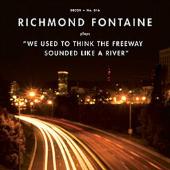The name Richmond Fontaine may sound like a type of fancy biscuit, but you can’t deny that We Used to Think the Freeway Sounded Like a River is quite the album title: nostalgic and poetic, and almost a short story in itself.
Led by Nevada singer-songwriter Willy Vlautin, a man who wears a plaid shirt like it’s a second skin (and with a qualification like that, yes, of course they’re playing End of the Road festival next month), el Fontaine are now on their eighth album. Since 2007’s Thirteen Cities, Vlautin has become a respected novelist — highfalutin’ Willy Vlautin, they call him these days — with his second, Northline, published last year to much acclaim, and another ready to roll for 2010.
It hasn’t all been back-slapping, cork-popping and highbrow high fives, though: sadly, the last year has seen Vlautin having to cope with the death of his mother and this gives every mention of the M-word on We Used to Think . . . a certain conspicuousness. Still, this is far from a personal outpouring of grief — as the sleeve proclaims, these are "14 songs written around and about the Pacific Northwest" and Vlautin doesn’t stray from his chosen remit as the man who tells a story.
Set to a kind of Wilco-with-a-hangover musical backing, the songs feature a range of frozen moments involving the usual unusual cast of everyday fuck-ups whose lives are slowly drifting beyond their control: the alcoholic who turns to boxing and gets battered in a new sense of the word in ‘The Pull’; the carer on the edge in ‘A Letter to the Patron Saint of Nurses’; the old friend losing himself in the anonymity of the city in ‘You Can Move Back Here’.
Jittery epic ‘Two Alone’ is another highlight, with Vlautin singing a call-and-response between a forklift driver, his girlfriend and his co-workers: an angry, "Why would you do that?" against a mumbled, "Uh, I don’t know, I was just, uh . . .", which later turns to a defiant, "I don’t like sports and I never will" — a calling cry for skinny indie kids if ever we heard one — and culminates in a rousing yell of, "No, I won’t, no I won’t!" The song takes flight where some of its companions seem to give up; more than once an instrumental interlude pulls to a stop and we realise we’ve missed the climax.
Close listening pays off, then. The protagonist of ‘The Boyfriends’ describes heading back to a woman’s apartment and having his canoodling interrupted by the sight of a child staring at him (yeah, eat your heart out, Barry White). "Man, I didn’t know she had a kid / Please, I ain’t like that, I ain’t like that!" protests Vlautin, and a gorgeous mariachi trumpet straight off the last Calexico album glides in. The second and only other verse of the song reels off a list of men, concluding with "the guy who lived in Winnebago, who’d always make my mum cry". Ah hah.
The simplicity with which Vlautin describes his creations, combined with a dry croaking drawl which more often than not makes room for a touch of empathy, gives them a depth. And he makes it look like an easy trick (though it’s likely that Europeans fond of the far-off dusty romance of John Steinbeck or Cormac McCarthy will fall harder than most). "He was 43 years old," goes ’43’, a furiously-played story of a guy gradually going broke; "Paying for his mother to be in a home / Paying for his ex-wife and kids in a different state / He worked in a paint store." Nothing to it, right? But the song sure works its way in.
Perhaps it’s hard not to feel a bit short-changed by these songs at times, particularly if you like your choonz to end with a big, crashing "New York, Newwww Yoooork!" Then again, it’s a relief for anyone who was irked by the overblown "will it never end?" stylings of, ooh, let’s say, Bruce Springsteen’s recent eight-minute album opener ‘Outlaw Pete’. Richmond Fontaine may not be able to tell the world much about fancy biscuits, but — despite that 10-word album title — it seems Vlautin could teach us all a thing or two about brevity.


